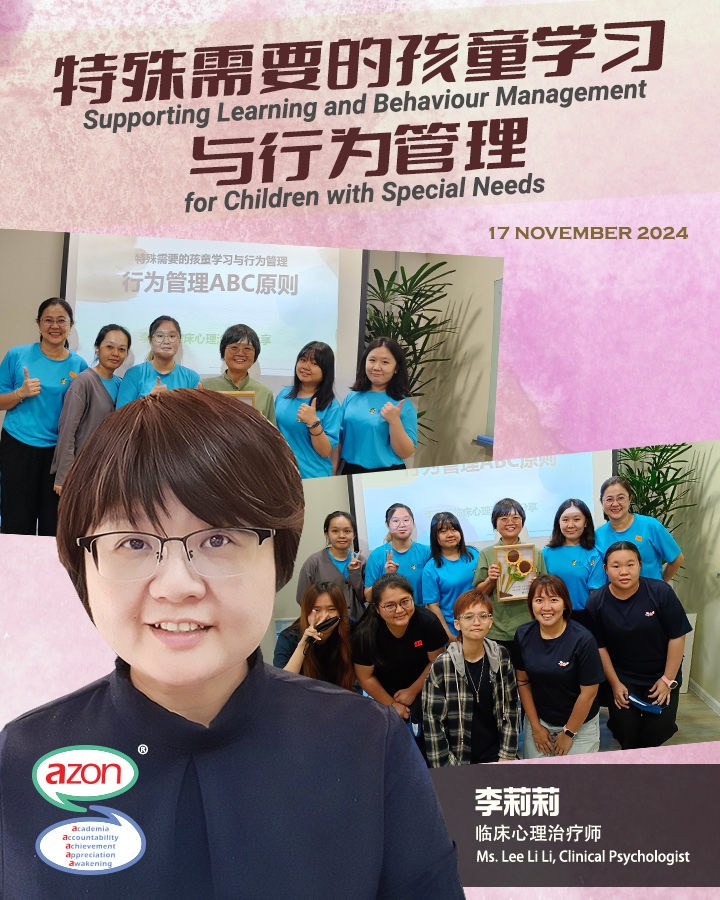
🎤 Speaker: Ms Lee Li Li, Clinical Psychologist
📅 Date and Time: 17 November 2024 (Sunday), 9:30 AM - 12:30 PM
📍 Location: Azon Allied Health & Educare Development Sdn. Bhd.
🏫 Organizer: Tong Yue Kepong Sri Bintang
🤝 Co-organizer: Bao Bei Reading Wonderland (Ara Damansara branch)
📚 Seminar Content
✨ Individualized Education Plan (IEP)
Clinical Psychologist Ms Lee Li Li provided a comprehensive explanation of creating individualized learning plans for children with special needs, ensuring that each child receives support tailored to their needs. She emphasised the key steps in the IEP process:
1. Screening and Referral
Early identification of a child’s special needs is crucial. If a child exhibits significant difficulties in learning or behaviour, parents should be encouraged to consult professionals, such as developmental paediatricians, child psychiatrists, or clinical psychologists, to facilitate further screening or assessment.
2. Assessment
During the assessment phase, a comprehensive understanding of the child’s current level of functioning is essential, including their learning abilities, language expressions, social interactions, and emotional regulation. The assessment report serves as the foundation for developing an effective and targeted education plan.
3. Planning
Based on the assessment findings, annual and short-term goals should be established. This phase includes adjusting teaching strategies (choosing suitable teaching-learning materials (TLM) for the child), incorporating classroom support (offering additional assistance for children who need it), and more.
4. Implementation
Ensuring that the child has ample opportunities to participate in educational activities while being integrated into the “least restrictive environment” (LRE) is essential. Extended school year services may be necessary for some children to support their achievement of set goals.
5. Evaluation
Ideally, monthly monitoring is recommended to assess the child’s progress. This ensures that the current teaching strategies and support systems are effective. Adjustments to the plan should be made promptly if challenges arise.
6. Review and Feedback
The IEP’s implementation should be reviewed every 3–6 months. Feedback is essential to evaluate whether the plan effectively supports the child’s ongoing development. If necessary, goals and methods should be revised and optimised.
✨ The ABCs of Behaviour Management
Clinical Psychologist Ms Lee Li Li elaborated on the ABCs of behaviour management (Antecedent, Behaviour, Consequence), emphasizing the importance of understanding the root causes of a child’s behaviour is fundamental to developing effective management strategies:
✨ Case Studies and Group Discussion
Clinical Psychologist Ms Lee Li Li shared real-life cases of identifying behaviour patterns and implementing suitable strategies, such as calmly managing avoidance behaviours and encouraging self-expression. These approaches support the development of positive learning habits and behaviours.
✨ Q&A Session
During the interactive Q&A session, participants shared practical challenges they faced in the classroom. Clinical Psychologist Ms Lee Li Li patiently addressed each question, offering actionable advice and guidance to enhance their teaching practices.
🌟 Support Services for Children with Special Needs
When supporting children with special needs, services should be tailored to their specific circumstances. Key considerations include:
🙏 Acknowledgements and Aspirations
A heartfelt gratitude to Tong Yue Kepong Sri Bintang and Bao Bei Reading Wonderland (Ara Damansara Branch) for their thoughtful organization and to every teacher for their enthusiastic participation. We hope this seminar not only provides professional knowledge but also brings more warmth and support to the growth of children with special needs. Together, let us brighten every child's future with compassion and commitment!
Note: The above content is taken from the training seminar on 17 November 2024 (Sunday) – "Supporting Learning and Behaviour Management for Children with Special Needs." For further details and assistance, please get in touch with our office.
📅 Date and Time: 17 November 2024 (Sunday), 9:30 AM - 12:30 PM
📍 Location: Azon Allied Health & Educare Development Sdn. Bhd.
🏫 Organizer: Tong Yue Kepong Sri Bintang
🤝 Co-organizer: Bao Bei Reading Wonderland (Ara Damansara branch)
📚 Seminar Content
✨ Individualized Education Plan (IEP)
Clinical Psychologist Ms Lee Li Li provided a comprehensive explanation of creating individualized learning plans for children with special needs, ensuring that each child receives support tailored to their needs. She emphasised the key steps in the IEP process:
1. Screening and Referral
Early identification of a child’s special needs is crucial. If a child exhibits significant difficulties in learning or behaviour, parents should be encouraged to consult professionals, such as developmental paediatricians, child psychiatrists, or clinical psychologists, to facilitate further screening or assessment.
2. Assessment
During the assessment phase, a comprehensive understanding of the child’s current level of functioning is essential, including their learning abilities, language expressions, social interactions, and emotional regulation. The assessment report serves as the foundation for developing an effective and targeted education plan.
3. Planning
Based on the assessment findings, annual and short-term goals should be established. This phase includes adjusting teaching strategies (choosing suitable teaching-learning materials (TLM) for the child), incorporating classroom support (offering additional assistance for children who need it), and more.
4. Implementation
Ensuring that the child has ample opportunities to participate in educational activities while being integrated into the “least restrictive environment” (LRE) is essential. Extended school year services may be necessary for some children to support their achievement of set goals.
5. Evaluation
Ideally, monthly monitoring is recommended to assess the child’s progress. This ensures that the current teaching strategies and support systems are effective. Adjustments to the plan should be made promptly if challenges arise.
6. Review and Feedback
The IEP’s implementation should be reviewed every 3–6 months. Feedback is essential to evaluate whether the plan effectively supports the child’s ongoing development. If necessary, goals and methods should be revised and optimised.
✨ The ABCs of Behaviour Management
Clinical Psychologist Ms Lee Li Li elaborated on the ABCs of behaviour management (Antecedent, Behaviour, Consequence), emphasizing the importance of understanding the root causes of a child’s behaviour is fundamental to developing effective management strategies:
- Identifying antecedent: For instance, why does a child suddenly leave their seat? Is it due to the difficulty of the task or an inability to focus?
- Training behaviour: For example, if a child completes one page of exercises successfully, encourage them to work on an additional small section. Gradually, increasing task duration to build focus and persistence.
- Providing appropriate consequences: Help children understand the outcomes of their actions, such as “completing the task quietly can get a reward.” However, it’s important to avoid excessive reliance on external rewards.
✨ Case Studies and Group Discussion
Clinical Psychologist Ms Lee Li Li shared real-life cases of identifying behaviour patterns and implementing suitable strategies, such as calmly managing avoidance behaviours and encouraging self-expression. These approaches support the development of positive learning habits and behaviours.
✨ Q&A Session
During the interactive Q&A session, participants shared practical challenges they faced in the classroom. Clinical Psychologist Ms Lee Li Li patiently addressed each question, offering actionable advice and guidance to enhance their teaching practices.
🌟 Support Services for Children with Special Needs
When supporting children with special needs, services should be tailored to their specific circumstances. Key considerations include:
- Alternative Education Options: Programmes such as segregated, integrated or inclusive education should be explored to match the child’s needs.
- Parent and Family Training: Equip parents with effective behaviour management and communication skills to extend support at home. Provide resources for siblings to foster understanding and acceptance of the child with special needs.
- Supplementary Services: Include therapeutic services (Speech, Occupational or Physical Therapy), medical services, and other related professional support.
- Universal Design for Learning (UDL): UDL promotes diverse teaching methods and adaptable environments to accommodate varying learning styles and needs. This approach ensures personalised learning for every child.
- Supplementary Devices and Accessibility: Provide adaptive learning tools and install accessible facilities, such as elevators and ramps, to create a supportive and inclusive environment.
- Educational Resources: Provide teachers with accessible learning resources and educational tools, ensuring teaching content is open and friendly to all students.
- Build Support Networks: Facilitate regular meetings between educators, parents, and professionals to maintain effective communication. Define responsibilities clearly, align goals, and ensure comprehensive support for the child.
🙏 Acknowledgements and Aspirations
A heartfelt gratitude to Tong Yue Kepong Sri Bintang and Bao Bei Reading Wonderland (Ara Damansara Branch) for their thoughtful organization and to every teacher for their enthusiastic participation. We hope this seminar not only provides professional knowledge but also brings more warmth and support to the growth of children with special needs. Together, let us brighten every child's future with compassion and commitment!
Note: The above content is taken from the training seminar on 17 November 2024 (Sunday) – "Supporting Learning and Behaviour Management for Children with Special Needs." For further details and assistance, please get in touch with our office.





